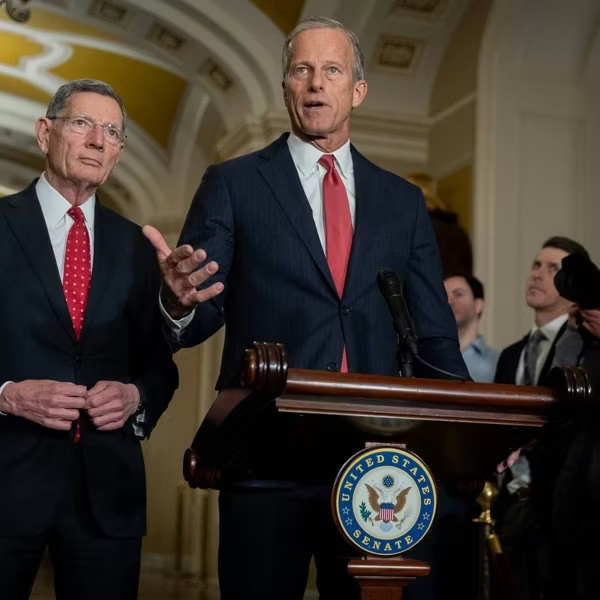Democratic Sen. Elizabeth Warren of Massachusetts on Thursday reintroduced a bill that would ban anti-union "right-to-work" laws and nullify those enacted by Republican lawmakers in 27 states.
"Democrats are making clear that we stand in solidarity with workers everywhere."
Contrary to what the misleading name suggests, "right-to-work" laws do not guarantee employment to job-seekers. Instead, they prohibit employers and unions from entering into agreements that require every worker covered by a contract to pay union dues--making it harder for organized labor groups to sustain themselves financially, undermining their collective bargaining power, and contributing to lower wages.
" Republicans and their corporate interest backers have imposed state laws with only one goal: destroy unions and discourage workers from organizing for higher wages, fair benefits, and safer working conditions," Warren said in a statement.
"At a time when labor unions are growing in both size, popularity, and delivering real wins for workers, Democrats are making clear that we stand in solidarity with workers everywhere," she added, "from Starbucks baristas to Google cafeteria workers and everyone in between."
Related Content
As US Workers Fight for Labor Rights, Public Support for Unions Soars to Five-Decade High
Julia Conley
The Nationwide Right to Unionize Act, which would repeal Section 14(b) of the National Labor Relations Act, has 18 co-sponsors in the Senate--all Democrats plus Sen. Bernie Sanders (I-Vt.). Warren previously introduced similar versions of the legislation in 2017 and 2020.
Rep. Brad Sherman (D-Calif.) unveiled a companion bill in the House, where a dozen Democratic co-sponsors, including Congressional Progressive Caucus Chair Pramila Jayapal (D-Wash.), have signed on so far.
"In an ill-conceived effort to attract business, one state after another has adopted these anti-union laws in a race to the bottom," said Sherman, who has introduced a version of the Nationwide Right to Unionize Act in every session of Congress since 2008.
So-called right-to-work laws are now on the books in a majority of states thanks to GOP-controlled Legislatures that are hostile to the labor movement. In 2017, Kentucky became the latest state to impose such a law. Missouri Republicans quickly followed suit, but voters overturned the anti-union legislation in a 2018 referendum.
Warren and Sherman's bill has received support from more than a dozen unions and advocacy organizations.
The Nationwide Right to Unionize Act "would finally start prioritizing the interests of workers in our nation's labor laws, which have always been stacked in the favor of employers," Marc Perrone, president of the United Food and Commercial Workers International Union, said in a statement. "The brave, essential workers who make up the UFCW can attest to the fact that the best way to improve a workplace has always been for workers to organize, form a union, and fight for their rights together."
"Right now, thousands upon thousands of Americans are doing exactly that, and, despite all the unfair hurdles they must overcome, workers are successfully organizing in new industries and new workplaces," said Perrone. "Passing this bill and rolling back decades upon decades of anti-worker legislation would be one of the single most important steps we can possibly take to empower the American workers that keep this country running."
As HuffPost reported:
Unions have been fighting right-to-work measures on multiple fronts in recent years. In addition to the state laws that have been passed, the conservative majority of the Supreme Court ruled in 2018 that government workers could not be required to pay what are known as "fair share" fees to cover the cost of union representation. The decision, Janus v. AFSCME, effectively made the entire U.S. public sector right-to-work.
A provision banning right-to-work legislation is included in the Protecting the Right to Organize (PRO) Act, a broader Democratic proposal to push U.S. labor law in a more worker-friendly direction. Among other reforms, the bill would also strengthen penalties against employers who engage in illegal union-busting and make it easier for newly unionized workers to finalize their first collective bargaining agreement.
Progressive lawmakers sought to include some measures from the House-passed PRO Act in the reconciliation package approved last month on a party-line vote, but such efforts were shot down by corporate Democrats.
"Rolling back decades upon decades of anti-worker legislation would be one of the single most important steps we can possibly take."
Although Democrats currently hold razor-thin majorities in the House and Senate, there is little to no chance that the PRO Act or Warren and Sherman's standalone initiative to undo right-to-work laws would make it to President Joe Biden's desk given the present composition of Congress.
Both pieces of legislation would have to overcome the Senate's 60-vote filibuster, an anti-democratic rule giving the GOP veto power over most legislation--something that right-wing Senate Democrats, including Joe Manchin (W.Va.) and Kyrsten Sinema (Ariz.), have refused to eliminate.
"Even if Senate Democrats were willing to dispense with the filibuster," HuffPost noted, "they could still struggle to get centrist colleagues in their caucus onboard with the plan."
Sinema and Sen. Mark Kelly "hail from the right-to-work state of Arizona and have a history of frustrating their party's progressive wing," the outlet added. Sinema, Kelly, and Sen. Mark Warner (Va.) are the only members of the Senate Democratic Caucus who have not co-sponsored the PRO Act, though Warner has said publicly that he supports it.
For now, the fate of the Nationwide Right to Unionize Act as well as the PRO Act depends on how Democrats perform in this fall's fast-approaching midterms, where control over Congress and the future direction of the U.S. is up for grabs.
Wisconsin's progressive Lt. Gov. Mandela Barnes and his Pennsylvania counterpart John Fetterman--both currently out-polling their respective Republican opponents in each battleground state--are widely viewed as the Democrats with the best chances to flip seats in the Senate. Such an outcome could help their party maintain, and possibly expand, its slim majority in the upper chamber.
If that happens and Democrats retain control of the House, lawmakers should not have to convince Biden--who has vowed to be "most pro-union president" in U.S. history--of the merits of either piece of legislation.
Biden has endorsed the PRO Act, which, like the Nationwide Right to Organize Act, would repeal right-to-work laws.
"We should change the federal law [so] that there is no right-to-work allowed anywhere in the country," Biden told a Teamsters conference in 2020. "For real. Not a joke."





